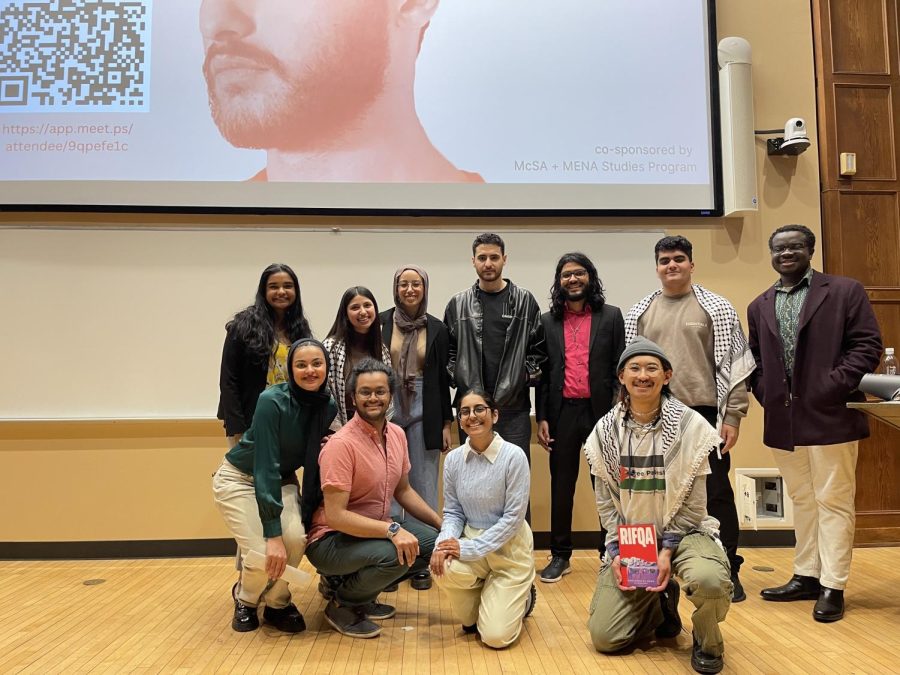Mohammed El-Kurd discusses respectability politics during Arab American Heritage Month
Mohammed El-Kurd stands fourth from the left, posing with members from Students for Justice in Palestine. El-Kurd spoke about misinformation about Palestine in the media Saturday.
May 1, 2023
Palestinian writer and poet Mohammed El-Kurd discussed respectability politics in front of about 100 students and community members at Lutkin Hall on Saturday.
In his remarks, El-Kurd argued activists should move beyond respectability politics to deliver honest messages about current events like the Palestine-Israel conflict.
“Respectability is when you have to heal a certain way, dress a certain way, say certain things, have a bunch of qualifiers before you move on to the important part,” El-Kurd said. “Tossing that out the window can be quite liberating for people.”
El-Kurd is the Palestine correspondent for The Nation and released his debut poetry collection, “RIFQA,” in 2021. He was named one of Time Magazine’s 100 most influential people in 2021.
The event, titled “Beyond Respectability,” was co-hosted by Students for Justice in Palestine, the Middle Eastern North African Students Association, Northwestern’s Community for Human Rights, the Muslim-cultural Students Association and the MENA Studies Program.
El-Kurd said he decided to work in journalism because of misinformation about Palestine in the media. Poetry offers him a path to explore similar topics, but with more freedom. He uses poetry to approach subjects like stalking and cyber illusionary violence — a useful medium because discussing his feelings on those topics could otherwise place him under scrutiny, he said.
He also said many people believe the portrayal of Palestinians in the media comes from reporters’ ignorance, but he said large media outlets like Fox News and CNN have reporters on the ground in Palestine. Reporters tend to ignore Israeli state violence because the occupation often serves establishments’ strategic interests, he said.
“It’s time that we approach protection for our people with a little bit more compassion,” he said. “We should be pushing for sanctions. We should be pushing for people to be ashamed to advocate for expansion as racist ideology like Zionism.”
The language used to discuss the Israel-Palestine conflict in the media is reflective of respectability politics, El-Kurd said. Many news outlets under-exaggerate the degree of violence inflicted upon Palestinians, he said, using terms like “forced eviction” instead of “ethnic cleansing.”
As a reaction to widespread demonization of Palestinians in the media, El-Kurd said some academics, citizens and journalists started to practice humanization — a practice that can entail flattening the reality of someone’s life. In doing so, he said writers fail to encapsulate the entire scope of Palestinians’ humanity.
“The full spectrum includes disdain, rage, hatred, joy, revolution, fear and all those things,” he said.
Weinberg junior Muhammad Saleh, a member of SJP who attended the talk, said El-Kurd’s view on humanization stood out to him. He said he’d like to see activists take broader routes to empower Palestinians instead of limiting them by describing them as defenseless victims.
El-Kurd’s blunt willingness to tell the truth also stood out to SESP sophomore Eman Hamed, a member of SJP. She said this is a quality El-Kurd almost uses as “a weapon” while being interviewed by journalists and in his daily life.
“I took away the fact that I should be mindful of the conversations we have about Palestine and the ways in which we water down those experiences to make them digestible, which is not necessarily fair,” Hamed said.
Hamed also said El-Kurd reaffirmed the importance of student activism. She said she was surprised by El-Kurd’s support because he critiqued how performative some types of activism within institutions can be.
Saleh said he felt inspired and capable of making change after hearing El-Kurd speak.
“I’m glad that he introduces us to these complex ideas so that we can implement them in our own thinking, and the way we go about our own actions to help Palestine,” he said. “He still acknowledges how important we can be as an institution to our own communities.”
Email: [email protected]
Twitter: @KristenAxtman1
Related Stories:
— Arab American Heritage Celebration brings flavor and fun to Allison dining hall
— Community members gather to honor lost Palestinian lives in Students for Justice in Palestine vigil
— Students for Justice in Palestine: Holding Andrew Yang accountable


